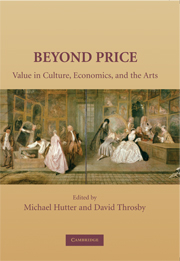Book contents
- Frontmatter
- Contents
- List of Contributors
- Preface
- 1 Value and Valuation in Art and Culture: Introduction and Overview
- PART ONE ORIGINS OF MEANING
- PART TWO THE CREATION OF VALUE IN ARTISTIC WORK
- 5 The Creation of Value by Artists: The Case of Hector Berlioz and the Symphonie Fantastique
- 6 Art, Honor, and Excellence in Early Modern Europe
- 7 Rubbish and Aura: Archival Economics
- PART THREE CONTINUITY AND INNOVATION
- PART FOUR APPRECIATION AND RANKING
- PART FIVE CULTURAL POLICIES
- Index
- Plate section
- Plate section
- References
7 - Rubbish and Aura: Archival Economics
from PART TWO - THE CREATION OF VALUE IN ARTISTIC WORK
- Frontmatter
- Contents
- List of Contributors
- Preface
- 1 Value and Valuation in Art and Culture: Introduction and Overview
- PART ONE ORIGINS OF MEANING
- PART TWO THE CREATION OF VALUE IN ARTISTIC WORK
- 5 The Creation of Value by Artists: The Case of Hector Berlioz and the Symphonie Fantastique
- 6 Art, Honor, and Excellence in Early Modern Europe
- 7 Rubbish and Aura: Archival Economics
- PART THREE CONTINUITY AND INNOVATION
- PART FOUR APPRECIATION AND RANKING
- PART FIVE CULTURAL POLICIES
- Index
- Plate section
- Plate section
- References
Summary
Worth and value
The central theoretical issue of this chapter is neatly laid out by David Throsby in his recent book Economics and Culture: “At some fundamental level, the conceptual foundations upon which both economics and culture rest have to do with notions of value” (Throsby 2001: 14). The problem is that in determining “cultural value … no metric for combining the various components of value exists,” the way the price–cost metric does in cases of economic value. Moreover, there is “a tendency for an economic interpretation of the world to dominate” a strictly cultural one because of “the ubiquity and power of the modern economic paradigm” (Throsby 2001: 41).
I take these assertions to be axiomatic. The most important thing not mentioned by Throsby, however, is that one of the “conceptual foundations” upon which “value” rests is strictly linguistic. On the first page of Capital, Karl Marx says that the crux of the issue is semantic, a matter of inherent verbal ambiguity complicated by cultural preferences for certain types of usage. “In English writers of the 17th century,” Marx notes, “we frequently find ‘worth’ in the sense of value in use, and ‘value’ in the sense of exchange-value. This is quite in accordance with the spirit of a language [English] that likes to use an Anglo-Saxon word [worth] for the actual thing, and a Romance word [value] for its reflexion” (Marx 1967, I: 36n).
- Type
- Chapter
- Information
- Beyond PriceValue in Culture, Economics, and the Arts, pp. 106 - 124Publisher: Cambridge University PressPrint publication year: 2007

